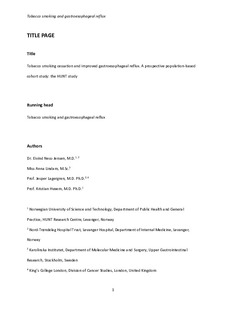| dc.description.abstract | OBJECTIVES:
Tobacco smoking increases the risk of gastroesophageal reflux symptoms (GERS), but whether tobacco smoking cessation improves GERS is unclear. The aim of this study was to clarify if tobacco smoking cessation improves GERS.
METHODS:
The study was based on the Nord-Trøndelag health study (the HUNT study), a prospective population-based cohort study conducted from 1995–1997 to 2006–2009 in Nord-Trøndelag County, Norway. All residents of the county from 20 years of age were invited. The study included 29,610 individuals (61% response rate) who reported whether they had heartburn or acid regurgitation. The association between tobacco smoking cessation and improvement in GERS was assessed by logistic regression, providing odds ratios (ORs) with 95% confidence intervals (CIs). The analyses were stratified by antireflux medication, and the results were adjusted for sex, age, body mass index (BMI), alcohol consumption, education, and physical exercise. Subgroup analyses were also stratified by BMI.
RESULTS:
Among individuals using antireflux medication at least weekly, cessation of daily tobacco smoking was associated with improvement in GERS from severe to no or minor complaints (adjusted OR 1.78; 95% CI: 1.07–2.97), compared with persistent daily smoking. This association was present among individuals within the normal range of BMI (OR 5.67; 95% CI: 1.36–23.64), but not among overweight individuals. There was no association between tobacco smoking cessation and GERS status among individuals with minor GERS or individuals using antireflux medication less than weekly.
CONCLUSIONS:
Tobacco smoking cessation was associated with improvement in severe GERS only in individuals of normal BMI using antireflux medication at least weekly, but not in other individual with GERS. | nb_NO |
